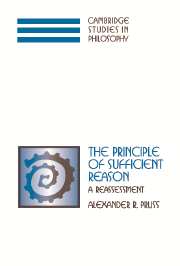Book contents
- Frontmatter
- Contents
- Acknowledgments
- Part I The Principle of Sufficient Reason and the Causal Principle
- Part II Objections to the PSR
- 4 A Modern Version of the Hume Objection
- 5 The Anti-theological Argument That There Are No Necessary Beings
- 6 Modal Fatalism
- 7 Free Will
- 8 Quantum Mechanics
- 9 Turning Leibniz against the PSR
- 10 What Survives the Criticisms of the PSR?
- Part III Justifications of the PSR
- Bibliography
- Index
10 - What Survives the Criticisms of the PSR?
Published online by Cambridge University Press: 27 July 2009
- Frontmatter
- Contents
- Acknowledgments
- Part I The Principle of Sufficient Reason and the Causal Principle
- Part II Objections to the PSR
- 4 A Modern Version of the Hume Objection
- 5 The Anti-theological Argument That There Are No Necessary Beings
- 6 Modal Fatalism
- 7 Free Will
- 8 Quantum Mechanics
- 9 Turning Leibniz against the PSR
- 10 What Survives the Criticisms of the PSR?
- Part III Justifications of the PSR
- Bibliography
- Index
Summary
We saw four distinct kinds of objections to the PSR. First, we had Humean objections to the PSR understood as a necessary truth, based on the idea that in constructing possible worlds we are free to rearrange the items in the universe in any way, and in particular in a way that excises causes. We saw that this idea itself has not been sufficiently supported in any of its forms. We are also going to see in Chapter 19 that on the best available account of possibility, such rearrangement is not possible, because in fact the best available account of possibility entails the PSR.
The second kind of objection to the PSR was bound up with indeterminisms of various sorts. The fatalism objection argued that the contingency of the world was incompatible with the PSR. The free will and quantum mechanics objections argued that theories that we have good reason to believe are correct are incompatible with the PSR. Third, the Leibnizian arguments showed that without some form of indeterministic causation we cannot causally account for the possibilities of indiscernible worlds.
We saw that the libertarian cannot, on pain of succumbing to the “brute randomness” objection to libertarianism, deny that free-will causal explanations are genuine explanations, even if they are indeterministic, and I defended free-will causal explanations using several models. In defense of both free-will causal explanations and quantum mechanical indeterministic causal interpretations, further, I argued on the basis of two principles.
- Type
- Chapter
- Information
- The Principle of Sufficient ReasonA Reassessment, pp. 184 - 186Publisher: Cambridge University PressPrint publication year: 2006



